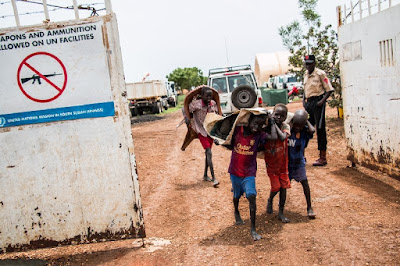The South Sudanese Civil War is an ongoing conflict in South Sudan between forces of the government and opposition forces. It began on the evening of 15 December 2013, at the meeting of the National Liberation Council meeting atNyakuron, when opposition leaders Dr. Riek Machar, Pagan Amum and Rebecca Nyandeng voted to boycott the Sunday December 15, 2013 meeting of the National Liberation Council (NLC). President Salva Kiir ordered the Sudan People's Liberation Movement (SPLM) Major General Marial Ciennoung, commander of the Presidential Guard (The Tiger Battalion) to leave the meeting venue and return to the barracks to disarm the troops. After disarming all ethnicities within the guard, Marial allegedly ordered that the Dinka members be re-armed. His deputy, from the Nuer ethnicity, began to question this order and a fight ensued when surrounding officers saw the commotion. The Nuer soldiers also re-armed themselves.Fighting erupted between the Dinka elements of the Presidential Guard and the Nuer elements. This lasted from Sunday night until Monday afternoon. Civilian casualties began when the Dinka elements of the SPLM began targeting Nuer civilians in the capital city of Juba.
President Salva Kiir has called it a coup attempt and announced that it had been put down the next day, but fighting again erupted on 16 December and spread beyond the capital, Juba, to the region around Jonglei which is prone to ethnic conflict. Early estimates stated that at least 1,000 people were reported to have been killed and over 800 other people were injured in Juba, but this number has now been cited to be much higher than initially thought as Human Rights Watch article cites eyewitness accounts of large numbers of bodies on December 17, and their removal in trucks to an undisclosed location December 18. Eyewitness accounts also cite SPLM Dinka troops assisted by guides in house to house searches to Nuer homes and killing civilians in Juba.[31] Similar door to door searches of members of the Nuer ethnicity have been reported in the government held Capital city Upper Nile State, Malakal.[32] A final death toll of civilian casualties in government held cities of Juba, Malakal, and Bentiu has not been released. The International Crisis Group estimated in their April 2014 report that over 10,000 had been killed in the conflict.
Kiir blamed former Vice President Riek Machar for instigating the "coup" but no evidence of a coup attempt has been found. Former Vice President Riek Machar has denied a coup attempt and instead blamed Kiir for playing power politics. Bor was seized by a Nuer militia on 19 December. On the same day, a UN compound was stormed in Akobo, Jonglei, resulting in the deaths of two Indian UNMISS peacekeepers. UN Secretary General has also issued deep concern as UN staff have received threats from the body guards of Senior government Information Minister that demanded armed access to UN Mission Camps where civilians are sheltering. Following this incident President Salva Kiir accused the UN of sheltering armed opposition forces in their UN Mission, which the UN has staunchly denied. Salva Kiir also accused the UN of an attempted take over of his leadership. February 10, 2014, UN base in Juba surrounded by armed government troops and policemen demanded the UN surrender Nuer civilians sheltering there. SPLA spokesman Phillip Aguer has not commented on the situation. On 18 February 2014, fighting between members of various ethnicities broke out within the UN Mission in the capital city of Upper Nile State, Malakal, resulting in ten deaths. It is not reported who is responsible for the deaths.
















0 Comments